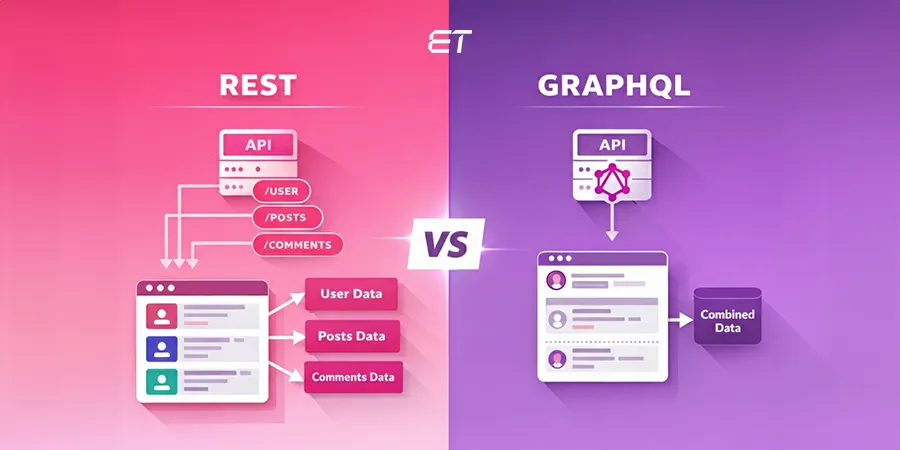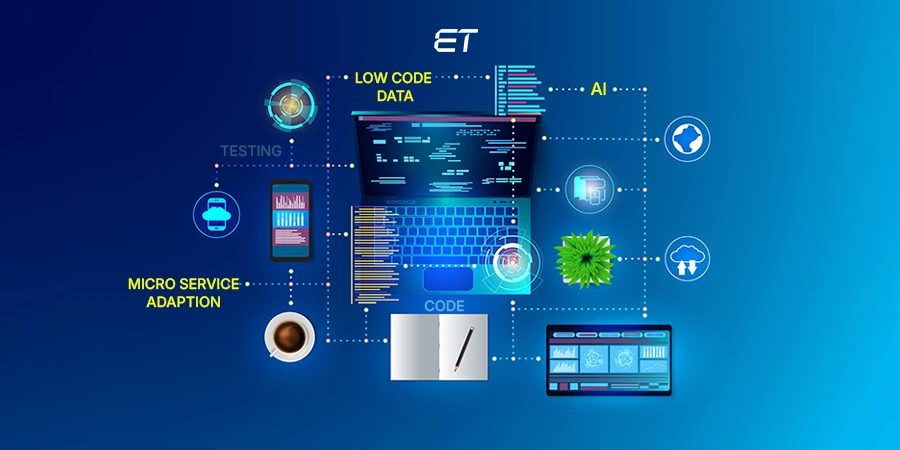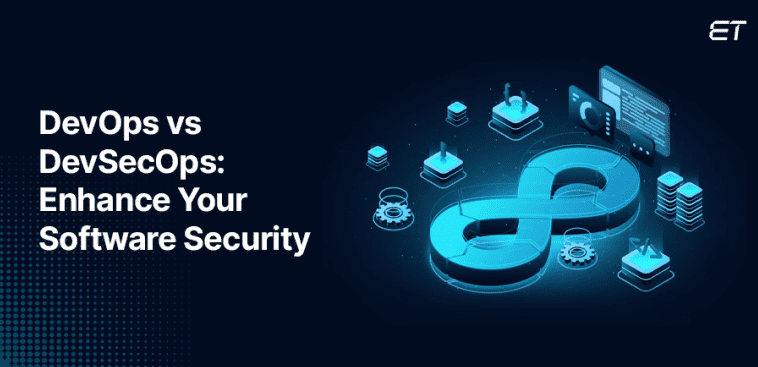
DevOps vs. DevSecOps: Key Differences, Similarities and Benefits
A high-speed bullet train racing alongside a vintage steam locomotive—sounds captivating, right? This metaphor perfectly illustrates the dynamic clash between innovative technology and traditional systems. These outdated systems, the steam locomotives of the corporate world, are loaded with crucial data and processes. However, their clunky interfaces and obsolete frameworks hinder progress.
Does this sound familiar to you? If yes, then you’re likely wondering– is there a way to break free from this technological standstill? Absolutely! The answer lies in integrating DevSecOps into your development process.
Curious how? Read further to understand. In this blog, we will unravel the differences between DevOps vs. DevSecOps and explain why adopting the latter is vital for today’s businesses.
Nevertheless, before moving forward, let’s quickly examine what DevOps and DevSecOps mean.
Let’s get started!

Take a tour to a detailed guide to learn more about the risks involved in software development in 2025.
What is DevOps?
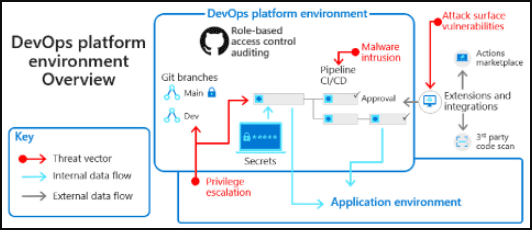
DevOps represents a set of practices that aim to streamline and integrate the processes of software development and IT operations. The primary goal is to shorten the system development life cycle while delivering features, fixes, and updates frequently and closely aligned with your business objectives.
Let’s have a look at its core principles below:
- Collaboration: DevOps breaks down the silos between development and operations teams, fostering a culture of collaboration and shared responsibility.
- Automation: By automating repetitive tasks, DevOps enhances efficiency and reduces the potential for human error. CI/CD pipelines are central to this process, ensuring that code is continuously integrated, tested, and deployed.
- Continuous improvement: Feedback loops are integral, allowing teams to monitor and improve their processes and products continuously.
What is DevSecOps?
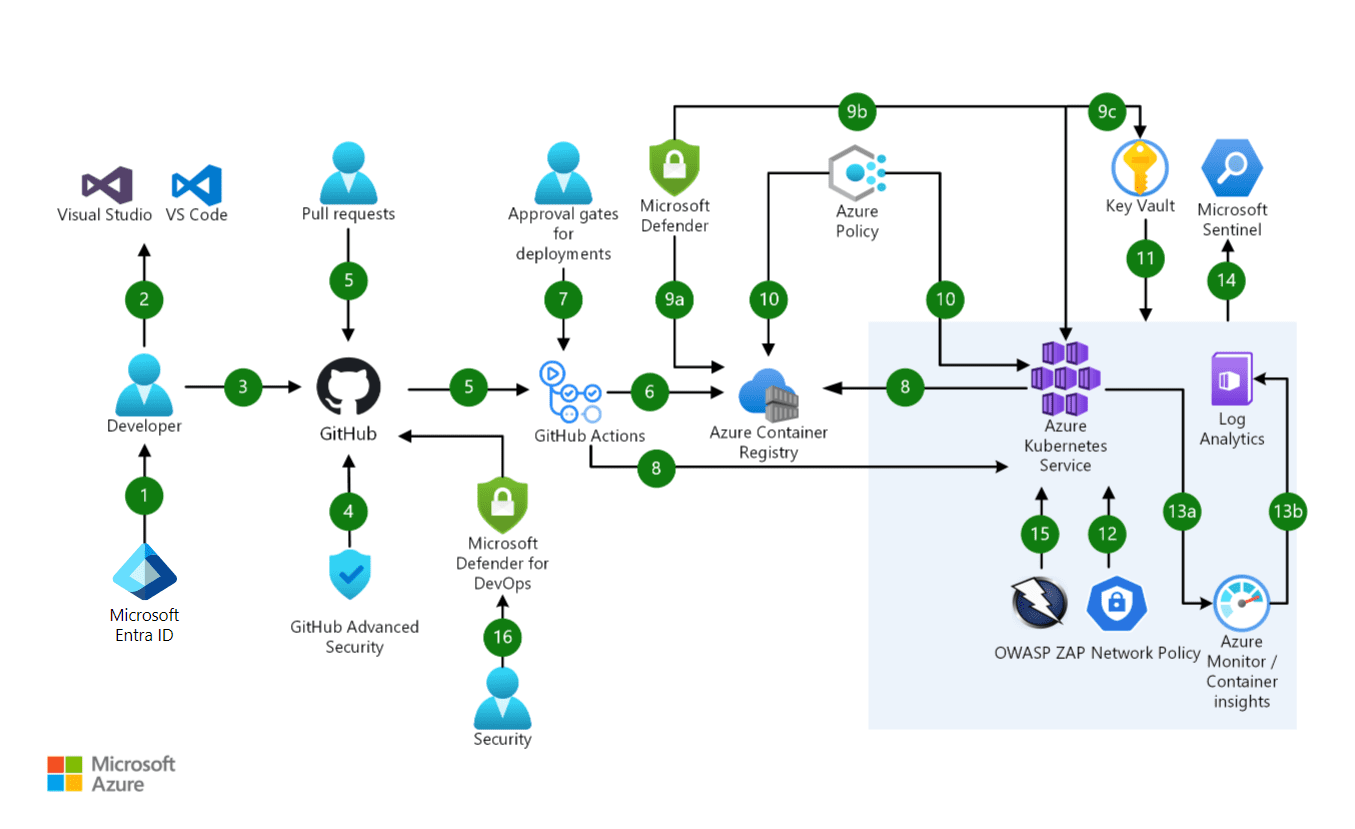
While DevOps focuses on speed and efficiency, DevSecOps introduces security into the former from the start. DevSecOps ensures that security is not an afterthought but a core component integrated into your software development lifecycle (SDLC) phase.
Let’s have a look at its core principles below:
- Shift Left Security: Security is integrated early in the development process, allowing teams to identify and address vulnerabilities before they escalate.
- Continuous Security: Security measures are built into the CI/CD pipeline, ensuring ongoing protection and compliance.
- Shared Responsibility: Security is a collective responsibility, with development, operations, and security teams working collaboratively to safeguard the software.

Want to learn more about software development methodologies? Find out the details in read.
Differences Between DevOps vs DevSecOps
DevOps focuses on streamlining software development and deployment, while DevSecOps integrates security into every stage of the DevOps pipeline.
Now, we will come to the main question– What are the key differences between DevOps and DevSecOps? Let’s take a look at the table below for a clear understanding:
| Aspect | DevOps | DevSecOps |
| Focus | Primary focus is on operational efficiency and speed delivery | Primary focus is security and compliance along with resilient software delivery |
| Security Integration | Security is often considered towards the end of the development cycle, potentially leading to vulnerabilities after deployment | Security is embedded from the outset, ensuring that vulnerabilities are identified and mitigated early in the SDLC |
| Team Involvement | Operations and development teams work together, breaking down traditional silos to improve efficiency | Extends this collaboration to include security teams, fostering a culture where security is a shared responsibility |
| Automation | CI/CD pipelines, automating development and deployment | Adds automated security testing and compliance checks |
| Risk Management | Focuses on operational risks and efficiency | Integrates risk management and compliance from the outset |
| Cultural Shift | Breaks down silos between Development and Operations teams | Emphasizes security awareness and shared responsibility |
| Compliance | Often considered post-deployment | Ensures continuous compliance and regulatory alignment |
Similarities Between DevOps vs DevSecOps
You know the difference between DevOps vs DevSecOps now, but there are many similarities between them as well. Let’s take a quick look at the similarities between them for a better understanding of DevOps vs DevSecOps:
| Aspect | DevOps vs DevSecOps Similarities |
| Goal | Both aim to enhance the speed and quality of software delivery. |
| Collaboration | Focus on breaking down silos between teams to foster a culture of shared responsibility and collaboration. |
| Automation | Both leverage automation to streamline processes from code integration to deployment for faster and more reliable releases. |
| CI/CD Approach | Continuous Integration and Continuous Delivery (CI/CD) are core to ensuring rapid and safe code changes. |
| Foundation for Security | DevSecOps extends DevOps principles by embedding security into the workflow, reinforcing it as a fundamental aspect. |
- Both share a common goal as they both aim to enhance the speed and quality of software delivery.
- Both emphasize on breaking down silos between development and operations teams, fostering a culture of shared responsibility and collaboration.
- Utilize automation to streamline processes from code integration to deployment, leading to faster and more reliable software software releases.
- Both rely on continuous integration and continuous delivery (CI/CD) to ensure rapid and safe code changes.
- DevSecOps builds on DevOps by integrating security measures into the workflow, treating security as a fundamental aspect of the development process.
Benefits of DevOps
Embracing DevOps unlocks multiple advantages if you are aiming to accelerate your software delivery while maintaining it’s efficiency and reliability. Let’s glance at the benefits it offers below.
Faster Time to Market
DevOps streamlines your software’s development and deployment through automation, reducing its release cycles. DevOps assists you in responding quickly to market demands.
Improved Collaboration
By breaking down silos between development and operations teams, DevOps fosters a culture of shared responsibility within your team, leading to better communication, faster issue resolution, and higher-quality software.
Enhanced Efficiency with Automation
From continuous integration (CI) to continuous deployment (CD), DevOps automates repetitive tasks, minimizing human errors and allowing your teams to focus on innovation.
Higher Software Reliability
Continuous monitoring and automated testing in DevOps ensure that your software is more stable. It reduces your software’s downtime and improves overall user experience.
Scalability and Flexibility
With DevOps, you can scale your software’s infrastructure dynamically and deploy updates seamlessly, adapting to the evolving needs of your users and workloads efficiently.
Benefits of Adopting DevSecOps
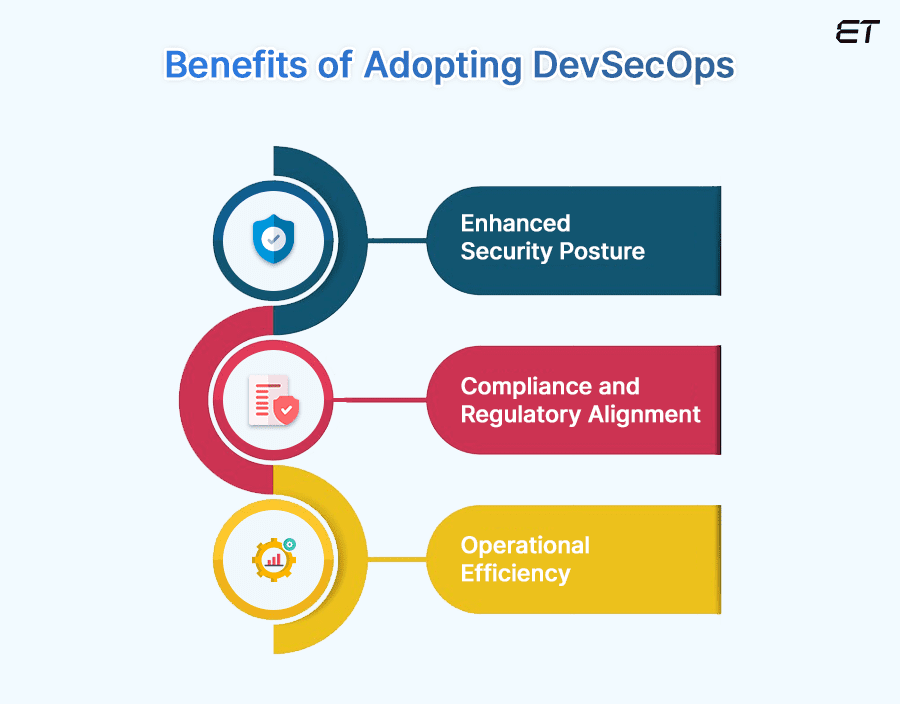
Without much ado, we will now discuss why DevSecOps and how it is beneficial for your business.
Enhanced Security Posture
As you know, DevSecOps integrates security throughout the process, reducing vulnerabilities and accelerating remediation times. This proactive measure ensures that security has a stronger posture and effectively mitigates risks.
Compliance and Regulatory Alignment
DevSecOps ensures continuous compliance with industry regulations and standards, simplifying the audit process and reducing the risk of non-compliance penalties.
Operational Efficiency
What makes DevSecOps bright and stand out from DevOps is that while adding security measures, it also maintains the efficiency benefits of DevOps by automating security checks and integrating them seamlessly into the CI/CD pipeline. This approach allows organizations to deliver secure software quickly and reliably.

Transform your DevOPs practices with integrated security. Learn now.
DevOps vs DevSecOps: Implementation, Challenges, and Solutions
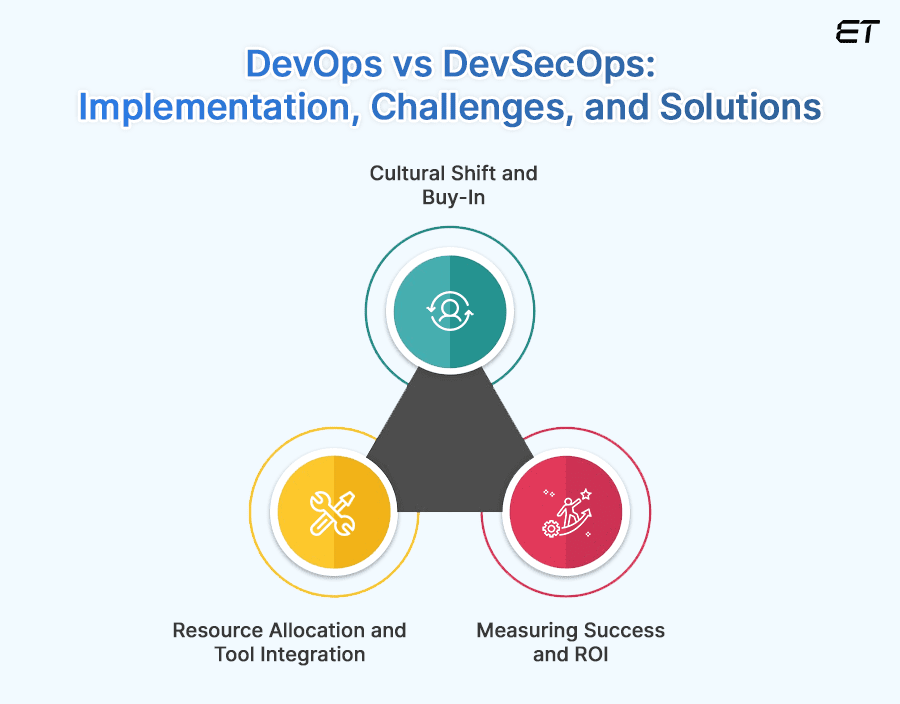
As a decision maker, you must know how to implement DevSecOps, what challenges will arise, and what solutions to pursue. Read further to ensure a seamless implementation of DevSecOps in your organization.
Cultural Shift and Buy-In
Implementing DevSecOps requires a cultural shift where security becomes everyone’s responsibility. Therefore, you need to foster a security-first mindset and provide continuous training to all the team members within the organization.
Resource Allocation and Tool Integration
Integrating security tools within existing DevOps can be challenging. Thus, make sure to balance budget constraints with the need for comprehensive security solutions. Choosing the right tools and ensuring they work seamlessly with the existing system is crucial.
Measuring Success and ROI
To measure the success of DevSecOps, substantiate key performance indicators (KPIs) such as the number of vulnerabilities detected and resolved, compliance audit results, and overall software delivery time. By demonstrating the ROI through reduced incidents and compliance costs, you can justify the investment in DevSecOps.
Successful DevSecOps Implementation Example
Now that we have discussed DevOps vs. DevSecOps and which one to choose, let’s witness a real-world example that has implemented DevSecOps.
Many leading enterprises have successfully adopted DevSecOps, resulting in improved security and operational efficiency. One of them is Adobe.
Adobe adopted DevSecOps to enhance its software security by integrating security measures into its CI/CD pipelines and development processes. They implemented automated security checks, fostered a collaborative culture among security, development, and operations teams, and moved security considerations to their earliest stages of development. This approach significantly reduced its security incident response time and improved its software security. This strategy of Adobe illustrates the effective integration of security without compromising development speed and efficiency.
Apart from this, DevSecOps is beneficial in highly regulated industries such as finance and healthcare. These industries require stringent security and compliance measures, and DevSecOps ensures that these requirements are met without any compromise on speed and efficiency.

Secure your development process with DevSecOps. Get in touch with us to learn how.
Best Practices of DevOps
Now that you’re aware of the implementation and challenges, let’s look at the best practices of DevOps below:
1. Foster a Collaborative Culture
One of the key pillars of DevOps is breaking down silos between development, operations, and other teams. Encourage open communication and shared responsibility to ensure that your teams work together seamlessly throughout the software development lifecycle. A culture of collaboration builds trust and improves overall productivity.
2. Implement Continuous Integration and Continuous Delivery (CI/CD)
CI/CD pipelines are the backbone of a successful DevOps process. By integrating code frequently and automating the deployment process, you can catch errors early, reduce manual work, and ensure faster, more reliable software releases.
3. Leverage Automation
Automation is essential for streamlining repetitive tasks such as testing, configuration, and deployment. Use tools that support infrastructure-as-code (IaC) to create consistent environments and minimize human error. This not only improves efficiency but also enhances scalability.
4. Focus on Monitoring and Feedback Loops
Continuous monitoring of your applications and infrastructure ensures that you can quickly identify issues before they escalate. Implement real-time dashboards and feedback loops to gain insights into system performance and user experience, allowing your teams to make informed decisions.
5. Prioritize Security from the Start
Security should not be an afterthought. Incorporate security checks at every stage of the DevOps pipeline to detect vulnerabilities early. This approach, often referred to as “DevSecOps,” ensures that security becomes an integral part of your development process rather than a separate step.
6. Optimize Resource Management
Efficient use of cloud and on-premises resources helps keep costs under control while maintaining performance. Leverage containerization and orchestration tools, such as Docker and Kubernetes, to allocate resources dynamically and improve your resource utilization.
7. Encourage Continuous Learning and Improvement
DevOps is an evolving practice. So you must regularly update your processes based on new insights, industry trends, and performance metrics. Encourage your teams to engage in training, share knowledge, and experiment with innovative ideas to stay ahead.
8. Measure Success with Key Metrics
Tracking metrics such as deployment frequency, lead time for changes, mean time to recovery (MTTR), and change failure rate helps evaluate the efficiency of your DevOps processes. Data-driven insights enable you to identify bottlenecks and continuously optimize performance.
Best Practices of DevSecOps
Implementing DevSecOps successfully requires integrating security seamlessly into every phase of the software development lifecycle. Here are the best practices to ensure a secure and efficient DevSecOps workflow:
1. Shift Security Left
In DevSecOps, security is not an afterthought—it starts from the very beginning. By embedding security measures during the planning, coding, and testing phases, you can identify vulnerabilities early and prevent costly fixes later in the development cycle.
2. Automate Security Checks
Manual security processes can slow down the workflow. Instead, use automated tools for static and dynamic code analysis, vulnerability scanning, and policy enforcement. This ensures consistent and faster security checks without compromising the pace of development.
3. Implement Continuous Security Monitoring
DevSecOps goes beyond code security by incorporating continuous monitoring of live environments. Real-time alerts, intrusion detection systems, and log analysis help identify and respond to threats proactively.
4. Foster a Security-First Culture
Security in DevSecOps is a shared responsibility. Train your development, operations, and security teams to collaborate and align their efforts. A culture of open communication ensures that security concerns are addressed early and collaboratively.
5. Leverage Infrastructure as Code (IaC)
IaC enables consistent and secure infrastructure provisioning through code. By defining security configurations as part of the codebase, you can prevent misconfigurations and enforce security policies across all environments.
6. Enforce Role-Based Access Control (RBAC)
Implementing strict access controls ensures that team members have permissions only for the tasks they need. Role-based access reduces the risk of unauthorized changes and limits potential attack vectors.
7. Conduct Regular Security Audits and Threat Modeling
Periodic security audits and threat modeling exercises help your teams stay ahead of potential vulnerabilities. These practices allow organizations to simulate potential attack scenarios and strengthen their defenses.
8. Integrate Security in CI/CD Pipelines
Embed security checks directly into CI/CD pipelines to catch vulnerabilities during code integration and deployment stages. This includes automated tests for compliance, static code analysis, and penetration testing to prevent security lapses.
9. Focus on Incident Response and Recovery
Develop a robust incident response plan to ensure quick action when a breach or issue occurs. Define clear roles, escalation paths, and recovery procedures to minimize downtime and data loss during security incidents.
DevOps vs DevSecOps: Which One to Choose?
DevOps and DevSecOps are essential methodologies in modern software development as each offers unique benefits.
While DevOps focuses on speed and operational efficiency, DevSecOps integrates security into the development process to ensure secure and compliant software delivery.
If you’re looking to balance speed with security, adopting DevSecOps is a strategic move. It will enhance your system’s overall security posture and ensure regulatory compliance.
Want to learn more about how you can integrate DevSecOps for your organization? Connect with us now, and we will strategize your move towards it according to your industry.
Frequently Asked Questions
1. What is the main difference between DevOps and DevSecOps?
The main difference between DevOps and DevSecOps is the integration of security. DevOps focuses on collaboration and efficiency between development and operations, while DevSecOps incorporates security practices from the start of the development cycle to ensure continuous security.
2. Why is security integration important in DevSecOps?
Security integration in DevSecOps helps identify and mitigate vulnerabilities early in the development process, reducing risks and ensuring compliance with industry standards.
3. Can DevSecOps slow down the development process?
The answer is ‘no’. It might seem like adding security could slow things down, however, DevSecOps aims to automate security checks within the CI/CD pipeline, maintaining efficiency while enhancing security.
4. What tools are used in DevSecOps?
DevSecOps uses tools like SonarQube for code analysis, Checkmarx for vulnerability scanning, and SIEM systems for security monitoring.
5. Who should adopt DevSecOps?
Organizations that prioritize both speed and security, especially those in regulated industries like finance and healthcare, should consider adopting DevSecOps to enhance their software development practices.
6. How to Transition from DevOps to DevSecOps?
Transitioning from DevOps to DevSecOps involves integrating security into every stage of the development lifecycle like educating your team on security best practices, incorporating automated security testing tools, and fostering collaboration between developers, operations, and security teams.
7. What is the difference between secdevops vs devsecops?
SecDevOps and DevSecOps both integrate security into the development lifecycle, but their focus differs.
DevSecOps embeds security from the start of the DevOps pipeline, ensuring continuous security checks. SecDevOps, on the other hand, prioritizes security first, influencing how your development and operations proceed. While both aim for secure software delivery, DevSecOps balances speed and security, whereas SecDevOps places security as the topmost priority.



